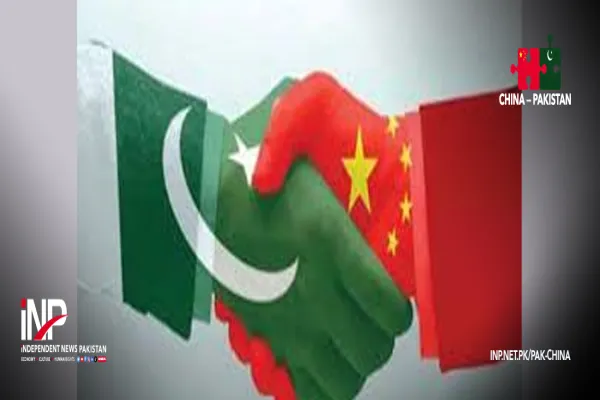i NEWS PAK-CHINA
China showed unflinching commitment to strengthen Pakistan's economy during 2022, Gwadar Pro reported on Friday. Amid economic instability, Net Foreign Direct Investment (FDI) in Pakistan dropped 52.1% during the first four months of the ongoing fiscal year (FY23), clocking in at just $348.3 million, revealed State Bank of Pakistan (SBP) data. Details showed that, during the same period, the highest FDI inflows came from China during the July-November period, amounting to $102.5 million. Despite the economic and political crises, the all-weather friend of Pakistan, China, remained the largest investor during the last fiscal year, as it made notable investment in its ongoing power, telecom, and financial projects.
China made the single largest investment of net $532 million in Pakistan in FY22, followed by the United States which injected net $250 million during the year. More recently, CPEC has given Pakistan a rare chance to boost FDI and private investment and restructure its economy. In 2022, China and Pakistan announced three new corridors including Green, Digital and Health corridors which will usher in a new era of development in Pakistan. Agriculture, food security, and green development will be the focus of the Green Corridor. Moreover, given the skill of our young people, we can state without a doubt that Pakistan has enormous potential in the digital corridor.
China has been a technical powerhouse in recent years, and its investment in the creation of suitable training facilities in the nation will help Pakistan maximise the potential of the youth. Similar opportunities exist for collaboration in the health and medical fields. The establishment of new hospitals, medical universities, research centres, pharmacies, and caregiving organisations will be the focus of this corridor. Some significant investments have been discussed in this article. A Chinese company, The East Sea Group has planned to build an oil refinery with an annual processing capacity of 8 million tons in Gwadar, with a huge investment of $4.5 billion.
Similarly, in December 2022, Opay, a Chinese corporation with operations in several nations, including Nigeria, pledged to invest $100 million in Pakistan's digital payments industry by boosting the number of points of sale (POS) from 10,000 to 100,000. Opay has already invested $4 million in Pakistan. Earlier in 2022, Chinese brand in the home appliances category, Midea has expanded its assembly line with two new products. Speaking at the launching ceremony of Midea in Pakistan, Consul General of China in Karachi Li Bijian voiced hope that the new assembly line would lead to import substitution for Pakistan, besides reducing its import bill and trade deficit.
In February 2022 Pakistan and China inked the Framework Agreement on Industrial Cooperation under the China Pakistan Economic Corridor (CPEC). The CPEC Joint Working Group (JWG) on Industrial Cooperation was established in 2016 and an MoU was signed between both parties in 2018. With the passage of time and as CPEC entered its second phase, the need for a comprehensive Framework Agreement became imperative. A major milestone regarding Chinese mining investment in Pakistan was achieved in November 2022. At an international conference on the lithium battery business held in Sichuan, China, a strategic agreement was struck between the China-Pakistan Joint Research Centre on Earth Sciences and Tianqi Lithium Co.
To better examine and research lithium reserves in Pakistan. According to the strategic agreement, both sides would work together to study and utilise Pakistan's lithium deposits.As Pakistan is going for clean, green, and affordable energy, China has come again. A Beijing-based multinational wind turbine manufacturer, Goldwind corporation, launched Pakistan's first solution factory in Pakistan. Additionally, China is helping Pakistan set up a waste-to-energy facility in Lahore. It is projected that the proposed facility will have an installed capacity of 40MW. It will have two turbine generators, each with a 20MW capacity. Similarly, Chinese companies are also heavily investing in Pakistan's solar and hydro sectors to provide clean and green energy.
China-Pakistan agricultural cooperation is also in full swing. China's maize-soybean strip intercropping technology completed harvest at 65 demonstration sites in Punjab, Sindh, and Khyber Pakhtunkhwa recently, and the production of maize and soybeans reached 8,490 kg and 889 kg per hectare respectively in the intercropped fields. Earlier this year, Zhang Jishu from Sichuan Litong Food Co., Ltd. announced that his company would implement a 1,000-acre pepper cultivation demonstration garden in Multan during the 2022-2023 growing season. In partnership with local agribusinesses and farmers in Pakistan, it intends to take over 15,000 acres of pepper orders in South Punjab, with a planned harvest of 30,000 tonnes of dried pepper.
Hybrid farming is growing in Pakistan in the variety of sectors, as Executive member of the Asia and Pacific Seed Association and General Manager of Wuhan Qingfa Hesheng Seed Company, Zhu Xiaobo said that the hybrid canola variety developed by her company has been planted in Pakistan about 10,000 hectares of land, covering around 6000 households. In the next three to five years, they expect it to expand to over 40,000 hectares and provide more, and healthy edible oil to Pakistan.
Credit: Independent News Pakistan-INP









